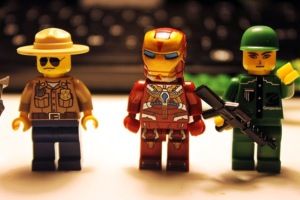News
Lego toys becoming more violent, claims study
This article is more than 9 years old.
Guns and weapons showing up more and more in playsets

Not as innocent as they used to be (photo: Niekonwencjonalna)
Weapons and violent scenarios are increasingly playing a bigger role in Lego’s products for children, according to research carried out by a team from New Zealand.
The researchers claim that Lego’s latest offerings are a far cry from the first weapons they ever produced: some swords and axes for a castle playset in 1978.
“Lego products are no longer as innocent as they once were,” the head researcher, Christoph Bartneck, told TV2. “The violence in Lego products now seems to go beyond just enhancing the playing experience.”
An ‘arms race’
The researchers determined that weapons and war-like scenarios now show up in over 30 percent of the Lego sets.
Even the company’s catalogue contains more violence, the researchers say.
“Nearly 40 percent of all the pages in the catalogue these days show some form of violence,” said Bartneck.
READ MORE: Lego reveals new figure in a wheelchair
However, the researchers, who studied Lego catalogues from 1973 until 2015, point out that Lego is simply following trends seen in all children’s toys.
“In order to capture their customer’s attention, toy manufacturers have been caught in a metaphorical ‘arms race’ to come out with new and exciting products,” wrote the researchers.






































